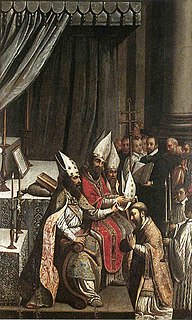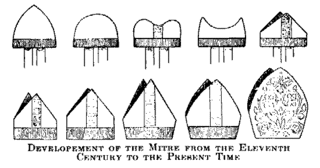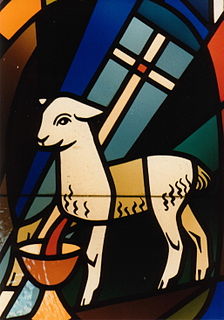Apostolic may refer to:
Apostolic may refer to:
An Apostle meaning one sent on a mission:

Apostolic succession is the method whereby the ministry of the Christian Church is held to be derived from the apostles by a continuous succession, which has usually been associated with a claim that the succession is through a series of bishops. Christians of the Roman Catholic, Eastern Orthodox, Oriental Orthodox, Old Catholic, Moravian, Hussite, Anglican, Church of the East, and Scandinavian Lutheran traditions maintain that "a bishop cannot have regular or valid orders unless he has been consecrated in this apostolic succession". These traditions do not always consider the episcopal consecrations of all of the other traditions as valid.

An episcopal polity is a hierarchical form of church governance in which the chief local authorities are called bishops. It is the structure used by many of the major Christian Churches and denominations, such as the Catholic, Eastern Orthodox, Oriental Orthodox, Church of the East, Anglican, Lutheran and Methodist churches or denominations, and other churches founded independently from these lineages.

Pentecostalism or classical Pentecostalism is a Protestant Charismatic Christian movement that emphasizes direct personal experience of God through baptism with the Holy Spirit. The term Pentecostal is derived from Pentecost, an event that commemorates the descent of the Holy Spirit upon the Apostles and other followers of Jesus Christ while they were in Jerusalem celebrating the Feast of Weeks, as described in the Acts of the Apostles.
Many Wikipedia articles on religious topics are not yet listed on this page. If you cannot find the topic you are interested in on this page, it still may already exist; you can try to find it using the "Search" box. If you find that it exists, you can edit this page to add a link to it.

Oneness Pentecostalism is a nontrinitarian religious movement within the Protestant Christian family of churches known as Pentecostalism. It derives its distinctive name from its teaching on the Godhead, which is popularly referred to as the Oneness doctrine, a form of Modalistic Monarchianism. This doctrine states that there is one God, a singular divine spirit with no distinction of persons who manifests himself in many ways, including as Father, Son, and Holy Spirit. This stands in sharp contrast to the doctrine of three distinct and eternal persons posited by Trinitarian theology.

In ecclesiology, the Christian Church is what different Christian denominations conceive of as being the true body of Christians or the original institution established by Jesus. "Christian Church" has also been used in academia as a synonym for Christianity, despite the fact that it is composed of multiple churches or denominations, many of which hold a doctrinal claim of being the "one true church", to the exclusion of the others.

A Christian denomination is a distinct religious body within Christianity that comprises all church congregations of the same kind, identifiable by traits such as a name, particular history, organization, leadership, theological doctrine, worship style and sometimes a founder. It is a secular and neutral term, generally used to denote any established Christian church. Unlike a cult or sect, a denomination is usually seen as part of the Christian religious mainstream. Most Christian denominations self-describe themselves as churches, whereas some newer ones tend to interchangeably use the terms churches, assemblies, fellowships, etc. Divisions between one group and another are defined by authority and doctrine; issues such as the nature of Jesus, the authority of apostolic succession, biblical hermeneutics, theology, ecclesiology, eschatology, and papal primacy may separate one denomination from another. Groups of denominations—often sharing broadly similar beliefs, practices, and historical ties—are sometimes known as "branches of Christianity". These branches differ in many ways, especially through differences in practices and belief.

The following outline is provided as an overview of and topical guide to Christian theology:

The charismatic movement in Christianity is a movement within established or mainstream Christian denominations to adopt beliefs and practices of Charismatic Christianity with an emphasis on baptism with the Holy Spirit, and the use of spiritual gifts (charismata). It has affected most denominations in the US, and has spread widely across the world.

The purpose of this timeline is to give a detailed account of Christianity from the beginning of the current era (AD) to the present. Question marks ('?') on dates indicate approximate dates.

The Catholic Charismatic Renewal is a movement within the Catholic Church that is part of the wider charismatic movement across historic Christian churches.

The Apostolic Church is a Christian denomination and Pentecostal movement that emerged from the Welsh Revival of 1904–1905. Although the movement began in the United Kingdom, the largest national Apostolic Church is now the Apostolic Church Nigeria. The term "Apostolic" refers to the role of apostles in the denomination's church government, as well as a desire to emulate 1st century Christianity in its faith, practices, and government.

Catholicity is a concept pertaining to beliefs and practices that are widely accepted by numerous Christian denominations, most notably by those Christian denominations that describe themselves as catholic in accordance with the Four Marks of the Church, as expressed in the Nicene Creed formulated at the First Council of Constantinople in 381: "[I believe] in one, holy, catholic, and apostolic Church."

The term Eastern Protestant Christianity encompasses a range of heterogeneous Protestant Christian denominations that developed outside of the Occident, from the latter half of the nineteenth century, and yet keep elements of Eastern Christianity, to varying degrees. Some of these denominations came into being, when existing Protestant churches adopted reformational variants of Eastern and Oriental Orthodox liturgy and worship. Some others are the result of reformations of Orthodox beliefs and practices, inspired by the teachings of Western Protestant missionaries. Some Eastern Protestant Churches are in communion with similar Western Protestant Churches. However, Eastern Protestant Christianity does not constitute a single communion. This is due to the diverse polities, practices, liturgies and orientations of the denominations which fall under this category.
Apostolic Church may refer to:
The expression "one true church" refers to an ecclesiological position asserting that Jesus gave his authority in the Great Commission solely to a particular visible Christian institutional church—what is commonly called a denomination. This view is maintained by the Catholic Church, the Eastern Orthodox Church, the Oriental Orthodox communion, the Assyrian Church of the East, the Ancient Church of the East, the Churches of Christ, and the Lutheran Churches, as well as certain Baptists. Each of them maintains that their own specific institutional church (denomination) exclusively represents the one and only original church. The claim to the title of the "one true church" relates to the first of the Four Marks of the Church mentioned in the Nicene Creed: "one, holy, catholic, and apostolic church". As such, it also relates to claims of both catholicity and apostolic succession: asserting inheritance of the spiritual, ecclesiastical and sacramental authority and responsibility that Jesus Christ gave to the apostles.

The following outline is provided as an overview of and topical guide to Christianity:

Protestantism is a form of Western Christianity that follows the theological tenets of the Protestant Reformation: a movement within Western Christianity that began seeking to reform the Catholic Church from within in the 16th century against what its followers perceived to be errors, abuses, innovations, discrepancies, and theological novums developing within the Catholic Church.

Articles related to Christianity include: